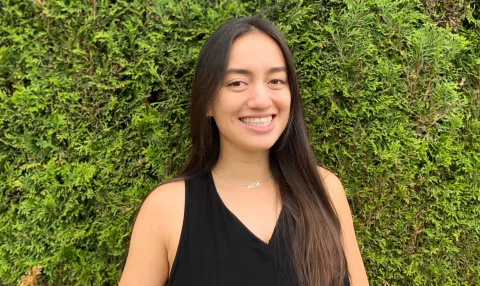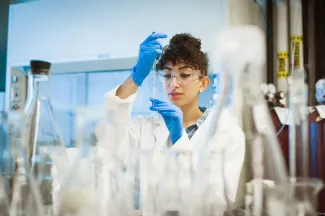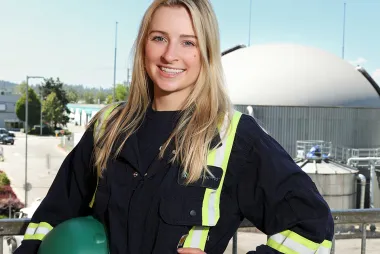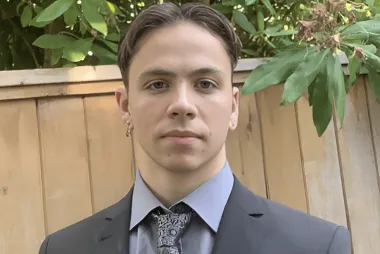"No matter what the field is, the people who are passionate about the work that they do have the greatest impact on those around them and are the ones who make innovation happen."

Emma Stanley
- Degree: Bachelor of Applied Science
- Grad year: 2020
- Program:
- Campus: Vancouver
The Chemical and Biological Engineering (CHBE) program at UBC was a huge factor in my decision to move to Vancouver from Calgary. I was really excited to join a program that would allow me to combine my passion for biology with an engineering perspective. I’ve been lucky enough to have plenty of opportunities over the course of my degree to do this, including being a part of the 2017 International Genetically Engineered Machine (iGEM) team, helping to co-found the UBC Synthetic Biology Club, doing my co-op terms at biotechnology companies and labs, and completing an undergraduate thesis with Dr. Karen Cheung and Dr. Jamie Piret. Along the way, I’ve also been able to contribute to the UBC community with a mental health initiative called CampusLightbox.com, at Women in Engineering events, and as Co-VP of Academic Affairs for the CHBE undergraduate society. My family, friends, managers, coworkers, and instructors have been an amazing network of support and guidance over the last five years.
Why did you choose to go into your field of study at UBC?
I've always had a strong interest in the life sciences, so when I started applying to universities, I knew that I wanted to incorporate aspects of biology into my career. After some research, I discovered the Chemical and Biological Engineering program at UBC, which seemed to be a great opportunity to combine that passion with my enjoyment of chemistry and aptitude for math and physics. People used to ask me if I wanted to be a doctor someday, but I've always been more intrigued by the behind-the-scenes biomedical research that goes into developing lifesaving technologies and treatments. CHBE has definitely provided me with the foundation and opportunities to pursue that career path.
What has made your time at UBC memorable?
My best memories from UBC are the ones that I’ve been able to share with the amazing people I've met. Looking back over the past few years, it's been the culmination of little, seemingly unremarkable moments: taking a study break to meet my family for dinner, getting a coffee with my best friend, and spending every class, capstone meeting, and study session with the lifelong friends I've made in CHBE - together all of those memories are what made my time at UBC really special.
What has been your most valuable non-academic experience studying at UBC?
All three of my co-op terms were great, but one of my best experiences during my time at UBC was as a Bioengineering Co-op Student at STEMCELL Technologies. I worked with a great group of people on a project developing tissue dissociation protocols for obtaining viable cells that researchers are interested in analyzing. My team provided me with a lot of independence and really challenged me to approach problems with a critical eye. Along with a lot of opportunities for professional growth, I was with an awesome group of fellow co-op students that became really good friends.
Tell us about your experience in your program. What have you learned that is most valuable?
Something that has been especially valuable to me that I didn’t necessarily expect to learn as part of a CHBE degree was coding. In first year, I definitely wasn’t a big fan of the mandatory Introduction to Engineering Programming course, but after doing CHBE courses which integrated MATLAB and Python I realized that I actually enjoyed coding quite a bit. That lead me to do an undergraduate thesis using Python, because I wanted to become more proficient at programming. The main aspect of my project was building an automated image acquisition and analysis program to quantify cell encapsulation rates in inkjet-printed droplets. The data acquired from this will be used to train a machine learning program. This project inspired me to start teaching myself machine learning, which I think will be really useful to apply in grad school and my future career.
How are you applying the skills you learned through your studies at UBC?
One of the most important things I learned at UBC was how to put my head down and work until I reached my goals, whether it was an exam, an assignment or a project. It’s good to know that I’ll be able to succeed at whatever lies ahead of me with the work ethic that I developed throughout my studies.
What advice would you give a student entering your degree program?
Take advantage of as many different types of opportunities as you can. Do your co-op terms in a couple different industries, even if you’re not sure you’ll like them. Do an extracurricular activity every year, whether it’s a design team, a club, volunteering or a research project. As an undergraduate, this is probably the only time where such a wide variety of opportunities are at your disposal. You learn a lot from your courses, but your experiences and what you take from them is what really makes you stand out.
How do you feel your degree has benefitted you compared to a different field of study?
I think that I would have enjoyed doing a degree in science, but in my experience as a CHBE student I found that I was able to pursue extracurricular activities and course options that allowed me to learn about the sciences that I’m interested in, while also opening a lot of doors that come with engineering experience. Understanding the fundamental equations and laws of chemical, biological and physical systems and knowing how to apply them when designing new systems is a unique aspect of an engineering degree. That knowledge and the perspective I’ve gained when approaching problems and working through solutions is probably the greatest benefit I’ve gotten from my degree.
Where do you find your inspiration?
My biggest inspirations academically and professionally have been the peers, instructors and managers I’ve had that truly love what they do. My main goal professionally is to be able to find a job that I love going to every day. No matter what the field is, the people who are passionate about the work that they do have the greatest impact on those around them and are the ones who make innovation happen. My family is also a big inspiration to me, reminding me to work hard but also not to take life too seriously and maintain a healthy balance.
What are your immediate and/or long-term plans for the future?
I’ve done all my work terms in biomedical research, which I love, but I’m hoping to expand my horizons a bit and see what other industries I would enjoy working in. There’s a lot that I can see myself doing, including environmental work or data science. However, at some point I think that I’ll probably end up pursuing a graduate degree in biomedical engineering, maybe in the field of brain-computer interface technology. I'm really into neuroscience and cognitive psychology, so it would be amazing to apply what I've learned to help those with neurological disorders.
What are your future plans to make a difference in our world?
I’ve worked on several STEM youth outreach initiatives, which are important to me because the science-based summer camps that I participated in as a kid had a big part in curating my interests and leading me to the path I’m on today. Of course I hope that I’ll be able to make a significant impact on people and the planet in whatever field I end up in career-wise, but it’s also really important to me to be able to continue to support organizations that inspire the next generation of scientists, mathematicians and engineers.




